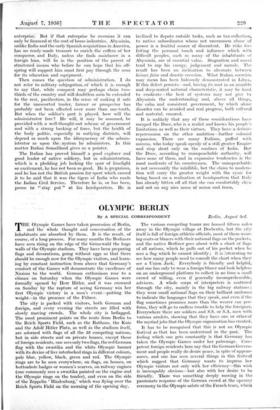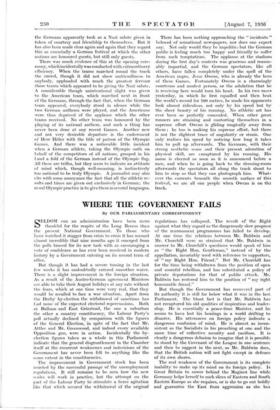OLYMPIC BERLIN
Or HE Olympic Games have taken possession of Berlin, " and. the whole thought and conversation of the inhabitants " are absorbed by them. It is the result, of course, of a long process. For many months the Berliners have seen rising on the edge of the Griinewald the huge walla of the Olympic stadium. They have been preparing .flags "and decorations, going without eggs so that there :should be enough now for the Olympic visitors, and learn- ing by constant instruction from above that Germany's conduct of the Games will demonstrate the excellence of Nazism to the world. German enthusiasm rose to a climax on Saturday when the Olympic Games were formally opened by Herr Hitler, and it was crowned on Sunday by the rapture of seeing Germany win her first Olympic victory in a men's event—putting the weight—in the presence of the Fiihrer.
The city is paeked with visitors, both German and foreign, and every evening the streets are filled with slowly moving crowds. The whole city is beflagged. The most proininent points on the route from Berlin to the Reich Sports Field, such ita. the Rathatis, the Knie and the Adolf Hitler Platz, as well is the stadium itself, are adorned with flags of all the 58 'competing nations, but in side streets and on private hinises; -eXcept. those of foreign residents, one sees only two flags, the red German . flag with the swastika and the white Olympic banner with its device of five interlocked rings in different colours, pale blue, yellow, black, green and red. The Olympic rings are to be seen everywhere, on flags, on houses, on buttonhole badges or women's scarves, on railway engines (one commonly sees a swastika painted on the 'enghie and the Olyinpic rings on-the tender), and even on the side of the Zeppelin Hindenbnik,' which 'was flying 'over- the Reich Sports Field on the morning of the opening "day. The various competing teams are housed fifteen miles away in the Olympic village 'at Doeberitz, but the city itself is full of foreign athletic officials, most of them wear- ing coats or blazers with their national flags on the pockets, and the native Berliner goes about with a chart of flags of all nations, which he pulls out of his pocket when he sees a flag which he cannot identify ; it is interesting to see how many people need to consult the chart when they see a Union Jack. Everybody is friendly and helpful, and one has only to wear a foreign blazer and look helpless on an underground platform to collect in no time a small crowd of willing, even if generally incomprehensible, advisers. A whole corps of interpreters is scattered through the city, mainly in the big railway stations ; they wear small national flags on their brilliant uniforms to indicate the languages that they speak, and even if the flag sometimes promises more than the wearer can per- form, they will go to endless trouble to help the foreigner. Everywhere there are soldiers and S.S. or S.A. men with various armlets, showing that they have one or other of the myriad jobs that the Olympic organisation has created.
It has to be recognised that this is not an Olympic festival as that has been understood in the past. The feeling which one gets constantly is that Germany has taken the Olympic Games under her patronage. Com- petent foreign residents here say that the German Govern- ' ment and people really do desire peace, in spite of appear- ances, and one has seen several things in this festival which suggest that Germany wants to impress her Olympic visitors not only with her efficiency—this wish is inescapably obvious—but also with her desire to be friendly.' There was something deeply moving in the .pasSionate response of the German crowd at the opening ceremony to the Olympic salute of the French team, which the Germans apparently took as a Nazi salute given in token of courtesy and friendship to themselves. But it has also been made clear again and again that they regard this as essentially a German festival at which the other nations are honoured guests, but still only guests.
There was much evidence of this at the opening cere- mony, which incidentally was conducted with extraordinary efficiency. When the teams marched round the track the crowd, though it did not show unfriendliness to anybody, applauded with much the greatest fervour those teams which appeared to be giving the Nazi salute. A considerable though unintentional slight was given to the American team, which marched next in front of the Germans, through the fact that, when the German team appeared, everybody stood in silence while the two German anthems were played, and the Americans were thus deprived of the applause which the other teams received. No other team was honoured by the playing of its national anthem, and such a thing has never been done at any recent Games. Another new and not very desirable departure is the endowment of Herr Hitler with the title of patron of the Olympic Games. And there was a noticeable little incident when a German athlete, taking the Olympic oath on behalf of the competitors of all nations, grasped in his Land a fold of the German instead of the Olympic flag. All these are trifles, but they seem to indicate an attitude of mind which, though well-meaning, is instinctively too national to be truly Olympic. A journalist may also cite with some annoyance the fact that all the athletic re- sults and times are given out exclusively in German; the usual Olympic practice is to give them in several languages. There has been nothing approaching the " incidents " beloved of sensational newspapers, nor does one expect any. Not only would they be impolitic? but the German public is feeling much too happy and friendly to' suffer from such temptations. The applause at the stadium during the first day's contests was generous and reason- ably impartial, and the German spectators, like all others, have fallen completely under the spell of the American negro, Jesse Owens, who is already the hero of these Games. Fortunately Owens is a charmingly courteous and modest person, or the adulation that he is receiving here would turn his head. In his two races yesterday, in which he first equalled and then beat the world's record for 100 metres, he made his opponents look almost ridiculous, not only by his speed but by the sheer' beauty of his running. No athletic art has ever been so perfectly concealed. When other great runners are straining and contorting themselves in a supreme effort Owens is gliding magically away from them ; he too is making his supreme effort, but there is not the slightest trace of angularity or strain. One only realises his speed by noticing how long it takes him to pull up afterwards. The Germans, with their strong aesthetic sense and their present adoration of physical skill, are enraptured by his running. His name is cheered as soon as it is announced before a race, and when he is going back to the dressing-room afterwards the spectators all along the track shout to him to stop so that they can photograph him. What- ever the currents beneath the smooth surface of this festival, we are all one people when Owens is on the track.







































 Previous page
Previous page